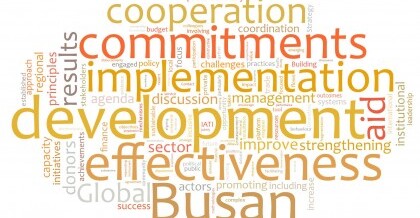
McLeod Group blog by Stephen Brown, November 29, 2016
In the early 2000s, Western donors finally recognized that they were partly to blame for foreign aid’s often disappointing results. The Paris Declaration on Aid Effectiveness, adopted in 2005, was the result of that soul-searching.
The Declaration was based on five core principles, including recipient countries’ ownership of their poverty reduction strategies, donors’ alignment with this vision and harmonization among donors. A total of 138 countries (donors and recipients), 28 international organizations and many civil society organizations endorsed these principles.
According to a report by the OECD, the industrialized countries’ organization that sponsored the discussions on aid effectiveness, the Paris Declaration would “significantly increase the impact of aid”. Still, it recognized that this would depend on donors’ “serious and sustained political resolve at the highest level”. Donors set themselves 13 quantitative targets to achieve by 2010. According to an OECD survey, however, they collectively reached only one.
Organizers broadened the invitation list for a high level forum, held in Busan, South Korea in 2011, at which participants broadened the agenda. Henceforth, they would no longer speak of aid effectiveness, but of development effectiveness. Even if no one knew exactly what that meant, they wanted to recognize that development could be the result of a number of factors, of which traditional aid was but one. They therefore needed to take into account contributions from the developing countries themselves, suppliers of South-South cooperation and the private sector, as well as other financial flows such as investment, trade and remittances.
In order to encourage China and other “emerging donors” to sign, the Busan agreement de-emphasized some of the Paris Principles. In particular, the final statement dropped alignment and harmonization as fundamental principles, while adding transparency and inclusive partnerships. It also recognized that non-traditional actors do not necessarily have to engage in the same way as traditional donors.
After Busan, the new Global Partnership for Effective Development Cooperation took over the agenda from the OECD. Led by representatives of development cooperation providers and recipient countries, local governments, civil society, the private sector, private foundations, the UN and the OECD, the Partnership established quantitative targets, as was the case after Paris. The results are not clearly presented in the progress report that was launched a few weeks ago, but it would appear that not a single target was achieved by 2015, although there has been some progress in most indicators. The fact that the report does not highlight this failure is surely a political decision.
The members of the Partnership are meeting again from November 28 to December 1, this time in Nairobi, Kenya. The agenda is extremely broad, with too little time allocated to discussions of the reasons for the disappointing results.
The draft Nairobi Outcome Document is already available online. It reaffirms the Busan principles, while ignoring the two important principles that were abandoned there, namely, alignment and harmonization. It also contains numerous pious wishes for the inclusion of all actors in all sectors, from security to humanitarian assistance, the need to link up with the Sustainable Development Goals and many more things – an agenda full of good intentions, but extremely diluted.
Between meetings, which take place every three years, the Global Partnership’s main activity seems to be monitoring, without seriously considering the reasons for the disappointing results or how to ensure the principles get implemented. It is easier to ignore such deeply political, sensitive issues.
Moreover, since Busan, the aid actors seem to have dropped out of the evolving agenda. On the ground, they are still operating under the Paris Principles, with a focus on aid. In Addis Ababa, Ethiopia, where I am currently interviewing donors, some Western representatives – including ambassadors and heads of development cooperation – have never even heard of the Global Partnership or the Nairobi high level meeting.
More than a decade after the Paris Declaration, its limits are clear. Aid actors still believe in ownership, alignment and harmonization, but often much more in form than in substance. For example, my research on aid effectiveness in three African countries has found that Western donors have established many sectoral working groups and subgroups, sometimes with government participation, to harmonize their collective efforts. However, most of the time, they only share information, without any donor changing its activities to harmonize with others.
Why is progress so limited? A fundamental explanation is donors’ refusal to make the required efforts, because it would take an enormous amount of time or because it would run counter to their own economic and political interests. For example, the career of Canadian development officers in Accra will benefit more if they pursue Global Affairs Canada’s priorities than those of another donor or the Ghanaian government. Donors’ desire to ensure the visibility of their own aid may prevent them from pooling their funds with others’. Recipient governments also often have an incentive to discourage donors from speaking with one voice and prefer to interact with them one-on-one.
Finally, the countries and many other stakeholders that sign these declarations are willing to commit to their effectiveness principles only because implementation remains voluntary. Even if it is hard to disagree with any of the principles contained in all these declarations, including those which are completely unrealistic, they are not sufficient to change the various actors’ basic behaviour. I am therefore rather sceptical about the impact the Nairobi meeting and the future activities of the Global Partnership will have on development.
The French version of this essay was published on the Huffington Post Québec blog Un seul monde on November 30, 2016.
